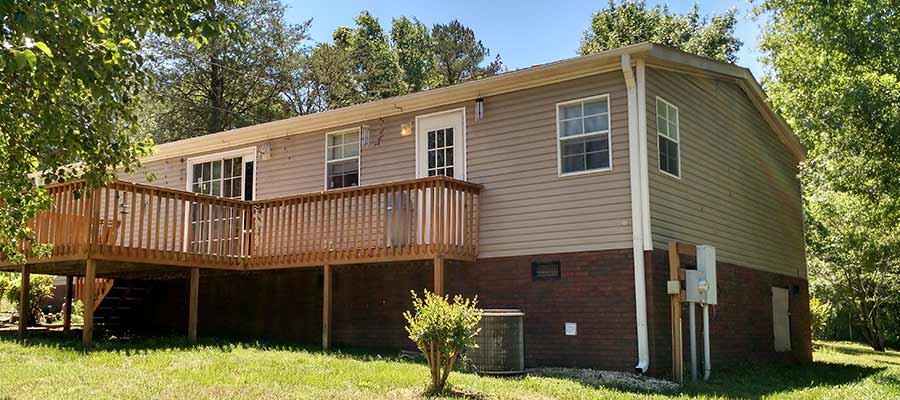
I recently had a pleasure of securing mobile home financing for a new real estate investor in Myrtle Beach, SC. He was purchasing a 1999 mobile home on a 1-acre lot. The property is located at the end of a street with stick built homes in the $150,000’s price range. It’s a good location and only about a 15-minute drive to the beach. Once the investor makes some improvements he plans to either rent it out or flip it. It was a very smooth transaction from start to finish so I decided to put together these 6 questions as a guide to help others understand what we look for in order to secure financing for a mobile home.
1. Is the Land Included In the Purchase?
First, in order to secure mobile home financing, the purchase must include the land on which the mobile home sits. The mobile home, however, does not need to be detitled. A mortgage will be recorded against the land and a separate lien will be recorded against the mobile home title. If the home has already been detitled it will be treated just like any other house purchase. In this case, only a mortgage needs to be recorded. On the Myrtle Beach transaction, the home was not detitled, therefore the private lender has a lien against the mobile home title and a mortgage against the land.
2. Are You Purchasing the Mobile Home as an Investment?
Your purchase transaction must be a real estate investment in order to secure mobile home financing with a private lender. We do not offer financing for owner occupied properties. The mobile home in Myrtle Beach, SC was purchased to be rented out or alternatively to be sold as a flip.
3. Do You Have a Substantial Downpayment?
How much cash do you have to put towards the purchase? Private lenders want to see that you have skin in the game. Unlike bank loans, mobile home financing with private lenders is based on the value of the property instead of your credit worthiness. Typically, most lenders will lend up to 65% of the value or the purchase price depending on risk and other factors. Don’t have enough cash? You can always put up additional real estate as collateral instead of bringing cash to closing. On the Myrtle Beach transaction, the investor/borrower had about a 50% down payment. He needed the loan to cover the remainder of the purchase price and to pay for all closing costs.
4. Is the Loan Amount Financially Feasible?
Does it make sense to finance the mobile home in the first place? The answer to that depends in part on the loan amount. When you use financing you’ll have to pay closing costs and attorney fees. Those fees may be similar for a $10,000 and a $50,000 mobile home. For example, an attorney may charge $400 to prepare the loan closing documents. That fee is going to be the same regardless of the purchase price. This applies to other closing costs too. For those reasons financing small amounts can carry a high cost and is not recommended. Financing a mobile home with a private lender usually requires a minimum loan amount of $20,000. All closing costs are rolled into the loan.
5. Have You Inspected the Mobile Home?
Now that I covered the biggest hurdles to financing a mobile home, let’s take a closer look at the home itself. What’s the condition of the mobile home? While some mobile homes are in decent shape, others can be in a rather poor shape, and then there are those you should just run from! For that reason, it’s a smart move to order an inspection report. First, it’s a great way to protect yourself and avoid any unnecessary or costly surprises. Having the property inspected by a licensed inspector also shows the private lender that you’ve done your homework. Last but not least, it makes our job of securing the financing easier and faster! Does the mobile home require major repairs? Have a contractor prepare an estimate instead of or in addition to the inspection.
Many traditional lenders have restrictions on the age of the mobile home. This has not been the case for us, especially when it comes to mobile home parks. That’s where you’re far more likely to encounter homes well over 20 years old.
6. Do You Have an Exit Strategy?
How will you pay off the loan? You need a solid exit strategy. Hard money loans are typically short-term interest only loans. They are great for acquisitions and bridge financing, but not for buy-and-hold properties. With mobile homes, refinancing is not usually an option due to age restrictions, minimum loan amounts and other stipulations imposed by traditional lenders. Even if you can increase your credit score and you have consistent W-2 income, the property itself will most likely not qualify for a refinance.
Lending HQ has secured a 2-year loan for the purchase of the Myrtle Beach mobile home. The borrower/investor has high enough income to actually pay off the loan within that term, or alternatively, he is exploring the option to flip the property for profit after making improvements.
Final Tips on Mobile Home Financing
Mobile home financing doesn’t have to be tough. If you’ve done your homework and you can answer the questions above you’re on the right track. Answering the questions should give you a good idea of what you’ll need when seeking a hard money loan or a private mortgage to purchase a mobile home. One tip of advice: always be cautious of working with any company requiring a large up-front fee to start working with you. Lending HQ has no up-front fees. You can start the process immediately by filling out this mobile home loan request form.

